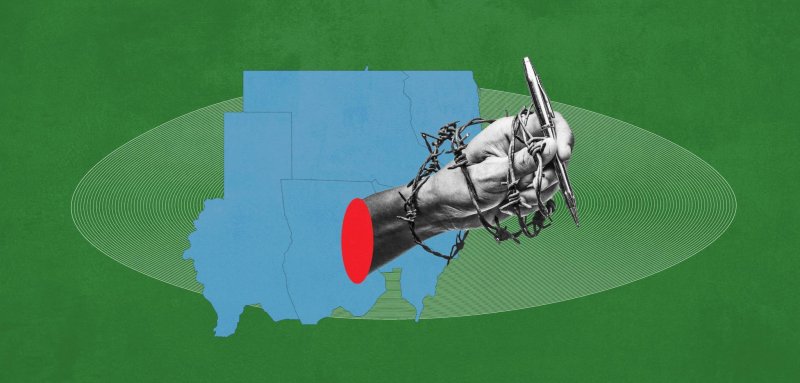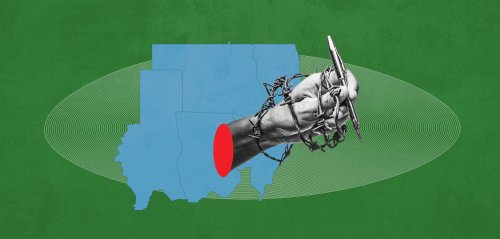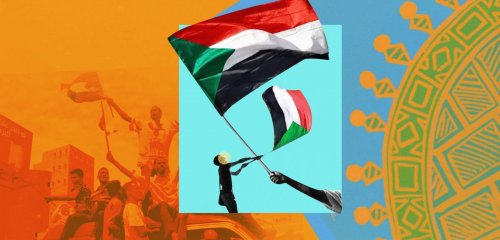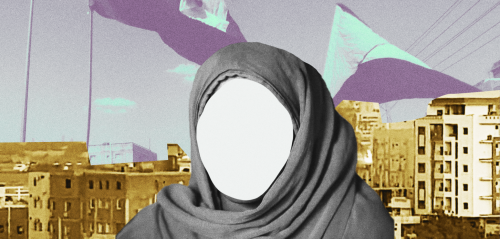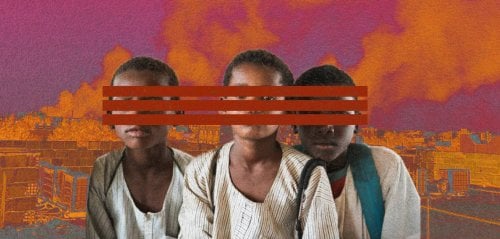Journalists were not exempt from the tragedies and violations that the Sudanese people have experienced since clashes broke out between the army and the Rapid Support Forces on April 15th, with the fighting mainly concentrated in the capital Khartoum, the center of all services and institutions.
Dozens of Sudanese journalists have been subjected to horrific violations, including physical assault, home invasions, terrorizing their families, and disrupting their work, especially those who rely on local journalism for their livelihoods. This has led to the spread of rumors and false content.
On May 20th, a group from the Rapid Support Forces stormed the home of journalist Ahmed Fadel, who works for Al Jazeera, where he was staying with his relatives and the cameraman working with the channel, Rashed Jibril. The armed group subjected them to physical assault, and took their mobile phones, money, and clothes at gunpoint, according to the Sudanese Journalists' Union. The union states that the same Rapid Support Forces that looted the journalist Ahmed Fadel's car had stopped him at one of their inspection centers the day before the raid on his house, where he was detained and spent the entire night at their mercy. Journalist Wajdi al-Kurdi spoke about his and his wife's injuries from shrapnel from randomly fired shells, in addition to the looting of all the possessions in his house, leaving nothing behind except the walls.
Concerns are growing over journalists being classified as enemies by the warring parties, which complicates their task of seeking the truth in the midst of the spread of false content and false information
Bad conditions
Head of the Sudanese Journalists Union Abdelmoneim Abu Idris says the union is trying to protect journalists by providing them with the necessary training to cover the conflict and demanding that all parties respect the right of journalists to move freely and be protected. The union is also considering the possibility of relocating those who are being threatened with death to a safe location. He mentions to Raseef22 that local media outlets, including radio stations, television channels, and newspapers, have halted their operations since the outbreak of the conflict. However, the real concern lies in the potential damage that might have befallen the audio and visual library of the radio and television stations. The army is attempting to regain control of the broadcasting headquarters from the Rapid Support Forces, while residents have reported airstrikes and heavy shelling around the headquarters, raising fears of the destruction of the library, which represents an important historical and cultural heritage for the people of Sudan.
Journalist Malaath Hassan says that she persisted and continued her work in the early days of the conflict despite prolonged power outages. However, she faced difficulties in communicating with the members of the website due to them being affected by the armed conflict.
She indicates that the lack of security has compelled her to leave the capital, Khartoum, without being able to arrange her affairs to resume work, due to the psychological pressure she has been subjected to. Malaath explains to Raseef22 that, aside from the mental trauma and pressure from the horrors of war and displacement, the absence of a permanent work location, as well as halted salary payments, and the inability to communicate with the team have greatly affected journalistic work.
Dozens of Sudanese journalists have been subjected to horrific violations, including physical assault, home invasions, as well as terrorizing their families, and disrupting their work, especially those who rely on local journalism for their livelihoods
She adds, "There is great difficulty in staying in Khartoum and covering the situation on the ground due to the lack of protection measures and the lack of interest from the warring parties in exposing violations. That is why even the journalists present in Khartoum cannot move in the field; they are limited to observation and following up from a distance."
She stresses that all of these factors have contributed to the spread of rumors, which were further amplified by the biased stance of some journalists towards one of the two sides of the conflict, thus aiding in the spread of misleading content.
Many journalists are living under challenging humanitarian conditions due to the suspension of their work. Speaking on this, a journalist told Raseef22 that he no longer has enough to feed his children. He mentioned that many people offered to sell him stolen goods and food items at less than 90% of their actual value, on the condition that he pay the price later, but he refused. He explained that he doesn't even have the money needed to flee the capital Khartoum.
Violations and unemployment
The Journalists Union said in a statement dated May 14th that the armed conflict has deepened the suffering of journalists. According to a survey conducted earlier this year, 250 journalists have left the profession, while another 250 have recently become unemployed.
It highlights that the media shutdown has displaced a significant number of journalists, while many media workers are living in difficult conditions and face daily dangers in search of the truth in the midst of the fighting. However, it also recorded violations that pose a direct threat to their lives.
The statement adds, "Several newsroom offices in central Khartoum were shelled, and dozens of journalists were stranded in their workplaces, which were located in the lines of fire between the warring parties. Some journalists were subjected to violations and repression while covering the clashes."
The union indicates that both warring parties are dissatisfied with the news and information covered and reported by independent journalists, and some journalists have received death threats in an atmosphere dominated by hate speech and media misinformation
The union indicates that both warring parties are dissatisfied with the news and information covered and reported by independent journalists. And some journalists have received death threats in an atmosphere dominated by hate speech and media misinformation.
The union has documented a number of serious violations, including the targeting of the headquarters of Al Jareeda newspaper, the office of Tana4Media agency, and the office of Al-Sharq channel with gunfire. It also reported gunfire targeting the car of the journalist Jameel Al-Fadil while he was trying to evacuate his family to a safe place. In addition, cameraman Fayez Abu Bakr was shot at with a pistol, and the correspondent of Sudan Radio in South Darfur, Khaled Sharaf Al-Din, was wounded in his leg and hand when a shell fell on his house.
In addition to physical violations and serious death threats, journalists face difficulties in monitoring the situation on the ground due to the lack of security and the prevalence of incidents that even target passersby. This forces them to rely on information from the warring parties, which is filled with war propaganda, in addition to medical sources and eyewitnesses.
There are growing concerns over journalists being classified as enemies by the warring parties, which complicates their task of seeking the truth in the midst of the spread of false content, which is mostly produced by journalists who support the army or the Rapid Support Forces.
On the night of Monday, May 22nd, a temporary ceasefire agreement for a period of 7 days came into effect, amid concerns about the parties not adhering to several previous ceasefire agreements.
Raseef22 is a not for profit entity. Our focus is on quality journalism. Every contribution to the NasRaseef membership goes directly towards journalism production. We stand independent, not accepting corporate sponsorships, sponsored content or political funding.
Support our mission to keep Raseef22 available to all readers by clicking here!
Interested in writing with us? Check our pitch process here!
